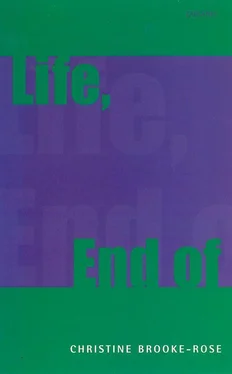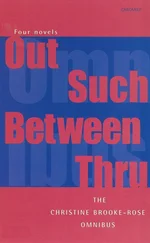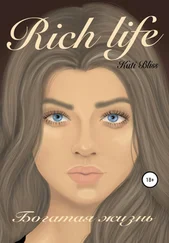Christine Brooke-Rose - Life, End of
Здесь есть возможность читать онлайн «Christine Brooke-Rose - Life, End of» весь текст электронной книги совершенно бесплатно (целиком полную версию без сокращений). В некоторых случаях можно слушать аудио, скачать через торрент в формате fb2 и присутствует краткое содержание. Год выпуска: 2012, ISBN: 2012, Издательство: Carcanet Press Ltd., Жанр: Современная проза, на английском языке. Описание произведения, (предисловие) а так же отзывы посетителей доступны на портале библиотеки ЛибКат.
- Название:Life, End of
- Автор:
- Издательство:Carcanet Press Ltd.
- Жанр:
- Год:2012
- ISBN:9781847775726
- Рейтинг книги:5 / 5. Голосов: 1
-
Избранное:Добавить в избранное
- Отзывы:
-
Ваша оценка:
- 100
- 1
- 2
- 3
- 4
- 5
Life, End of: краткое содержание, описание и аннотация
Предлагаем к чтению аннотацию, описание, краткое содержание или предисловие (зависит от того, что написал сам автор книги «Life, End of»). Если вы не нашли необходимую информацию о книге — напишите в комментариях, мы постараемся отыскать её.
by a master of experimental novels finds the author reflecting on her old age and its effects on her writing. As she reflects on her own career, her experiments with narrative, and on the narrative she writes here, she ultimately reasserts herself and accepts the life behind her.
Life, End of — читать онлайн бесплатно полную книгу (весь текст) целиком
Ниже представлен текст книги, разбитый по страницам. Система сохранения места последней прочитанной страницы, позволяет с удобством читать онлайн бесплатно книгу «Life, End of», без необходимости каждый раз заново искать на чём Вы остановились. Поставьте закладку, и сможете в любой момент перейти на страницу, на которой закончили чтение.
Интервал:
Закладка:
Do you want a siesta or a walk?
A walk of course.
Remember I can only walk slowly, with a cane, and half an hour at most.
The talk now goes up and down and in and out, to very different topics, Poland after Communism, Germany after reunification, Africa afer everything. Education, sex — for in her late seventies, looking fifty, she blithely ends a long love affair with a Frenchman half her age. That’s how young and energetic she is. Such conversations — few — are an illusion of the world, the universe. Clung to but slowly perishing. True Friendship. Presumably it’s the same whatever the topics shared. Or even without any? Who speaks? The Author? The Character?
Not the Author, who has had to withdraw for a while and let the Character take over. For this is a reconstruction, clearly, of a discussion that in fact continues in bits over forty-eight hours, split, interrupted, digressed, upped and downed. And of a time that’s over, with walking, cooking, receiving, still the norm. People don’t talk like that, it’s against all the elementary rules of novel or scenario, even of autobio. But this isn’t a scenario. Or a novel. Or an autobio. It’s a dying diary, undated except indirectly because the sense of time is lost. And the conversation exists, somewhere in the memory, as the author exists even pronounced dead. What gets lost is precisely the forkings, the omissions, the digressions, the interruptions, the ups and downs and ins and outs of real talk. Perhaps it’s really or also Life, End of: The Novel. What remains is the topic absorbed by two lives, retained in the neuronal spaces and excited backlash. Forming the friendship is the topic absorbed by two lives, retained in the neuronal spaces and excited backlash. Forming the friendship through the years.
She sends a slim four-inch book of Heine’s poems, from the German bookshop in Paris, following a childlike question about Heine’s Grenadier poem, learnt at school and sung to Schumann’s music, which is gallivanting or trudging round that busy brain but with two lines missing. She is always generous, not just with presents but with the time and trouble taken for others at eighty-five. That’s her unusual Christian character, never preaching or arguing, but always helping Polish and French friends, her far less practical brother, Africans, and even now regularly serving every evening, at a soup kitchen and shelter for the unlodged.
Ah, the role-model again. But beyond reach.
This friendship is a mirror of genu(ine re)flexion.
10
But this, unknown to the Character, is all a puny rehearsal for a leap ahead into reality. Why such a fuss about a sprain, even double? Is it a premonition of the helplessness to come? Yes, there is fiery painful Pollyanna, but she’s not mortal. She grows devilish after two years of hospital visits, for a pausing heart, a pulmonary embolism, anginal attacks, kidney insufficiency, but all this is now under Vasco de Balmer’s control, neverheless bringing about a lack of exercise that interests the doctor for the cardio-vascular system. Vasco de Drama, however, is not doing his job of sudden total relief from Polly New Writis — Polly what? Polyneuritis. Polly Kettleon. Which encourages all these flat cogitations about the flattened world.
The ipomea devils still laugh, one above the other, near the house, providing the leaves are still in the shade and those beyond them still in the sun. Every chin becomes a nose and vice versa, an avalanche of hooked-in profiles:
When there’s a breeze the crocodile mouths open wider to laugh louder, the smaller goose-beaks quack, the rounded old mouths mumble. And when the sunlight behind them goes they all disappear, which seems climatically correct.
But now the large green leaves cover almost the whole wall. Gone are St Peter and St Paul, Rembrandt, Beckett, Beethoven, the Grenadier, Haydn, Christ, Athena and the rest. Only the further half of the top row remains, from the small Artemis, white now or else just shining in the rising sun, to the large Artemis at the end whose vast profile closes the wall over three levels. Both have flat top heads as carry-a-tides but they could be water-carriers. The large Artemis now wears a long green beard, with two blue flowers and green side-whiskers, looking like Poseidon. Or is it a high-worn scarf? Perhaps she is Ceres after all, floating in nature, in which case as imagined before she should now appear in her Greek version, or Athena as Latin Minerva.
As for Nietzart, there’s a curious addition. The right side of Nietzsche’s face — his right — which forms Mozart’s nose underlined by Nietzsche’s right moustache, is now a half-profile of Sir Walter Raleigh’s ruff, his head inside Nietzsche’s among the curls of Mozart’s wig, looking down grimly, not towards Virginia or Guyana or Cadiz but concentrating on his coming execution.
Still fairly bedridden after six weeks, oh for a good bedriddance. Unable to walk, because of Pollyanna rather than the sprains, unless zimming with the physio can be called walking. Anyway zimming is hardly zestful. Six weeks without a hairwash, hoping against hope to do it alone under the shower as before. So Valérie rings a home-hairdresser she knows — she knows everyone in the village and the next — who comes on Friday with a tall head-bowl and long tubes that connect with the shower and bathtub. Needing a disobedience to the physio’s ban on zimming without him. Just to reach the bathroom. The shampoo and cut and set are successful, sitting comfortably on a straight chair. Then practising on the zimmer alone the whole weekend, then telling him on Monday. Since his responsibility is safe, he approves, congratulates, encourages. Now why couldn’t God do that? It’s still, however, excruciating for the two pillars of fire. After all five minutes a day with him to the living-room and back is nothing to what is being achieved alone.
The highest ambition and deepest desire is to be able to zimm to the loo and no longer use the bedpan. That is then achieved. And at once the highest ambition and deepest desire is to be able to wash at the washstand, though sitting on a chair, as for the hairdresser without of course being able to lean the hypothalamus against the mirrored cupboard, now too high. That toilet-dream is also reached and the chief joy is now to be able to brush the teeth after supper instead of before, with the nurse. And, admittedly, to say goodbye to the nurses, however charming and lively. In any case, their prescribed days are at an end. So that the physio and Valérie at midday are doubly welcome, and give quite enough attention.
But if zimming alone to the bathroom is now the highest ambition and deepest desire, this confirms that there are moments in life when only the immediately preceding achievement and the immediately subsequent wish are relevant. There is no point in regretting the car and the cane, or in longing to walk again. Can black holes be the origin of life? As someone or other says on TV.
Nevertheless, what losses?
Back to the brain, enduring as a beehive of memory, or is it Kant’s Schwärmerei of buzz words?
Husbands, lovers, no, no regrets, loss almost organised.
What else? It seems today that there’s far more fun than loss throughout, until loss perhaps accumulates in old age.
Driving. And the late diagnosis. The feet two blocks of ice after five minutes, much later the ordering of a car with all commands on the wheel, but already tried in such a car lent by the garage, so refused, in vain, for the kindly visiting salesman assures it’s not the same mechanism but it is. Must be a hard job, lying all the time. No offer or information about retraining. Self-practice alone along the local country roads is all. Then the crashed backing into the gate, the decision to stop driving. The car, symbol and instrument of independence, the Polish poet abandoned by car, into a new life, a new career, now thirty-three years ago. Compared to the twenty-two of that marriage. Nevertheless, the car-loss drives deep, prefiguring all later losses of independence that slowly accumulate in one tiny detail after another. But at that distant time, still walking. Half a mile. Instead of driving through two or three countries within days. Hence the O.P. problem. The annulment of existence. But less and less distressing as the change is slowly accepted. And solitude, long sought for after all, even more appreciated than before. Solitude, not loneliness. English has two words, the native one here more feelingly cruel. After all, anger on principle does mean dropping the principle or at least accepting the breakage of it, to avoid self-righteous indig. In any case, why and wherefore judge? Le pourquoi n’est pas le pour quoi. Everyone is someone’s O.P. that’s hardly news. Just a bad passage during the initiation.
Читать дальшеИнтервал:
Закладка:
Похожие книги на «Life, End of»
Представляем Вашему вниманию похожие книги на «Life, End of» списком для выбора. Мы отобрали схожую по названию и смыслу литературу в надежде предоставить читателям больше вариантов отыскать новые, интересные, ещё непрочитанные произведения.
Обсуждение, отзывы о книге «Life, End of» и просто собственные мнения читателей. Оставьте ваши комментарии, напишите, что Вы думаете о произведении, его смысле или главных героях. Укажите что конкретно понравилось, а что нет, и почему Вы так считаете.












